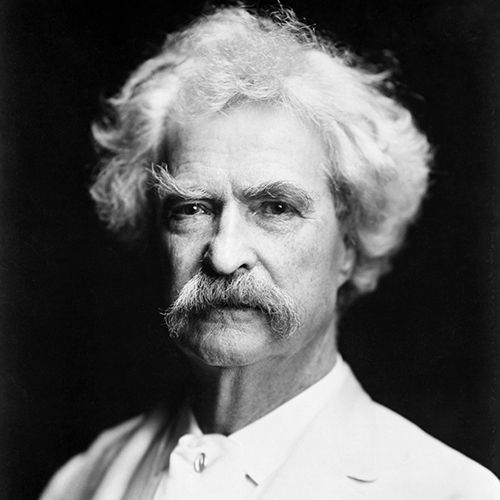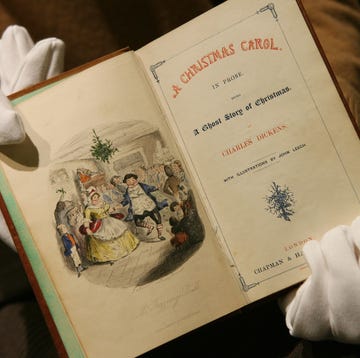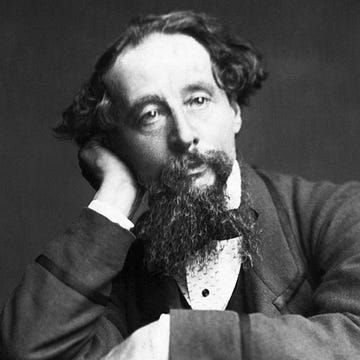1835-1910
Who Was Mark Twain?
Mark Twain, whose real name was Samuel Clemens, was a celebrated writer and humorist who is best known for his classic American novels The Adventures of Tom Sawyer and its sequel Adventures of Huckleberry Finn. Twain wrote several other novels, including The Gilded Age, Life on the Mississippi, and The Innocents Abroad, as well as short stories and essays. In his lifetime, he also worked as a journalist, riverboat pilot, lecturer, and entrepreneur.
Quick Facts
FULL NAME: Samuel Langhorne Clemens
BORN: November 30, 1835
DIED: April 21, 1910
BIRTHPLACE: Florida, Missouri
SPOUSE: Olivia Langdon (1870-1904)
CHILDREN: Langdon, Susy, Clara, and Jean
ASTROLOGICAL SIGN: Sagittarius
Early Life
Mark Twain was born Samuel Langhorne Clemens in the tiny village of Florida, Missouri, on November 30, 1835, to John and Jane Clemens. He was the second youngest of seven children. Only three of his siblings—Henry, Orion, and Pamela—made it to adulthood—while the other three—Margaret, Benjamin, and Peasant—died as children. When young Sam was 4 years old, his family moved to nearby Hannibal, a bustling river town of 1,000 people.
His father worked as a storekeeper, lawyer, judge, and land speculator, but never achieved financial success and even struggled to feed his family at times. Twain later recalled that he “could hardly stand his father” growing up, and according to his autobiography, he never saw the stern man laugh.
His mother, by contrast, was a fun-loving, tenderhearted homemaker who spent many nights telling stories to her family. After John died unexpectedly in 1847, she became the head of the household. The Clemens family soon “became almost destitute,” wrote biographer Everett Emerson, and was forced into years of economic struggle—a fact that would shape the trajectory of Twain's career.
Twain in Hannibal
Twain stayed in Hannibal until age 17. The town, situated on the Mississippi River, was in many ways a splendid place to grow up. Steamboats arrived there three times a day, tooting their whistles and circuses and minstrel shows regularly paid visits.
However, violence was commonplace, and young Twain witnessed much death. When he was 9 years old, he saw a local man murder a cattle rancher, and at age 10, he witnessed white plantation overseer kill an enslaved person with a piece of iron.
Hannibal inspired several of Twain's fictional locales, including the fictional St. Petersburg in The Adventures of Tom Sawyer and Adventures of Huckleberry Finn. These imaginary river towns he created were complex places that were at once vibrant and rife with cruelty— both parts of Twain's boyhood experience.
The young Twain kept up his schooling until his father died when he was about 12 years old. In need of a source of income for his family, he found employment as an apprentice printer at the Hannibal Courier, which paid him with a meager ration of food. In 1851, at age 15, he got a job as a printer and occasional writer and editor at the Hannibal Western Union, a little newspaper owned by his brother, Orion.
Steamboat Pilot and Gold Prospector
Then, in 1857, 21-year-old Twain fulfilled a lifelong dream: He began learning the art of piloting a steamboat on the Mississippi River. A licensed steamboat pilot by 1859, he soon found regular employment plying the shoals and channels of the great river.
Twain loved his exciting and well-paying career, but his service was cut short in 1861 by the outbreak of the Civil War, which halted most civilian traffic on the river. As the war began, the people of Missouri angrily split between support for the Union and the Confederate States. Twain opted for the latter, joining the Confederate Army in June 1861 but serving for only a couple of weeks until his volunteer unit disbanded.
In search of greater prospects for his future, he decided to head out to the great American West. Twain climbed on board a stagecoach in July 1861 and headed for Nevada and California, where he would live for the next five years.
At first, he worked as a silver and gold prospector in the California mines, convinced that he would become the savior of his struggling family, but was soon disappointed when nothing panned out. By 1862, Twain was flat broke and in need of a regular job.
Journalist
Twain knew his way around a newspaper office and went to work as a reporter for the Virginia City Territorial Enterprise in Virginia City, Nevada. He churned out news stories, editorials and sketches, and along the way adopted the pen name Mark Twain — steamboat slang for 12 feet of water.
Twain became one of the best-known storytellers in the West. He honed a distinctive narrative style — friendly, funny, irreverent, often satirical and always eager to deflate the pretentious.
He got a big break in 1865, when one of his tales about life in a mining camp, “Jim Smiley and His Jumping Frog,” was printed in newspapers and magazines around the country. The story later appeared under various titles, including “The Celebrated Jumping Frog of Calaveras County.”
Books
Twain's next step up the ladder of success came in 1867, when he took a five-month sea cruise in the Mediterranean, writing humorously about the sights for American newspapers with an eye toward getting a book out of the trip. In 1869, The Innocents Abroad was published, and it became a nationwide bestseller. At 34 years old, the ambitious journalist and traveler had become one of the most popular and famous writers in America. Nearly a decade later, in 1876, Twain published his now renown novel, The Adventures of Tom Sawyer, about a young boy growing up along the Mississippi River. According to biographer Everett Emerson's Mark Twain: A Literary Life, writing this work freed him from the “inhibitions of the culture he chose to embrace.” Twain published a sequel, the classic Adventures of Huckleberry Finn, in 1884.
Overall, he wrote more than two dozen books, along with several short stories, letters, and essays. Here are some of his major works.
Publisher and Investor
Business and writing were of equal value to Twain and he set about his cardinal task of earning a lot of money. In 1884, he triumphed as a book publisher, founding the publishing house Charles L. Webster and Company, named after his nephew. The firm issued the bestselling memoirs of former President Ulysses S. Grant, who had just died, and even published his own novel Adventures of Huckleberry Finn.
Twain soon branched out into other business ventures, investing $300,000 in the Paige Compositor typesetting machine, designed by James W. Paige. He also invested $50,000 on an illustration printing machine. While Twain was certain that his efforts would be rewarded with enormous wealth, he never achieved the success he expected. In fact, he ended up losing a great deal of money.
In 1894, Twain declared bankruptcy his publishing house went under and his investments failed. Twain's financial failings, reminiscent in some ways of his father's, had serious consequences for his state of mind. They contributed powerfully to a growing pessimism in him, a deep-down feeling that human existence is a cosmic joke perpetrated by a chuckling God. Another cause of his angst, perhaps, was his unconscious anger at himself for not giving undivided attention to his deepest creative instincts, which centered on his Missouri boyhood.
To recoup his losses and pay his creditors, Twain embarked on a lecture tour of the British Empire, which included Australia, New Zealand, South Africa, and India. He later wrote about his journey in his 1897 book Following the Equator.
Wife Olivia Langdon
Worried about being a Westerner in a country dominated by strait-laced, wealthy families, Twain developed an “overwhelming sense of inferiority,” according to scholar Hamlin Hill, noting that these feelings were competing with his aggressiveness and vanity. His fervent wish was to get rich, support his mother, rise socially and receive what he called “the respectful regard of a high Eastern civilization.”
In February 1870, Twain improved his social status by marrying 24-year-old Olivia “Livy” Langdon, the daughter of a rich New York coal merchant. Shortly after his wedding, he wrote to his friend, William Bowen, professing his good luck: “I have ... the only sweetheart I have ever loved ... she is the best girl, and the sweetest, and gentlest, and the daintiest, and she is the most perfect gem of womankind.”
Livy, like many people during that time, took pride in her pious and genteel approach to life. Twain hoped that she would “reform” him, a mere humorist, from his rustic ways. The couple settled in Buffalo and later had four children.
But while those years were gilded with awards, they also brought him much anguish. Early in their marriage, he and Livy had lost their toddler son, Langdon, to diphtheria; in 1896, his favorite daughter, Susy, died at the age of 24 of spinal meningitis. The loss broke his heart, and adding to his grief, he was out of the country when it happened.
His youngest daughter, Jean, was diagnosed with severe epilepsy. In 1909, when she was 29 years old, Jean died of a heart attack. For many years, Twain's relationship with middle daughter Clara was distant and full of quarrels.
In June 1904, while Twain traveled, Livy died after a long illness. “The full nature of his feelings toward her is puzzling,” wrote scholar R. Kent Rasmussen. “If he treasured Livy's comradeship as much as he often said, why did he spend so much time away from her?”
But absent or not, throughout 34 years of marriage, Twain had indeed loved his wife. “Wheresoever she was, there was Eden,” he wrote in tribute to her in The Diaries of Adam and Eve.
Later Years and Death
Twain's last 15 years were filled with public honors, including degrees from Oxford and Yale. One of the most famous Americans of the late 19th century, he was much photographed and applauded wherever he went.
And yet, Twain had become somewhat bitter. While projecting an amiable persona to the public, he privately demonstrated a stunning insensitivity to friends and loved ones. “Much of the last decade of his life, he lived in hell,” Hill wrote in the 2005 paper “Dangerous Intimacy: The Untold Story of Mark Twain's Final Years.”
As an older man, Twain wrote a fair amount but was unable to finish most of his projects. His memory faltered and he suffered from bouts of rage and paranoia. Twain also experienced periods of depression, during which he found solace in smoking cigars, reading in bed, and playing endless hours of billiards and cards.
Twain died of a heart attack on April 21, 1910, at age 74 in Redding, Connecticut. He was buried in Elmira, New York, where his wife and children were laid to rest.
Twain is remembered as a great chronicler of American life in the 19th and early 20th centuries and has been widely honored since his death. The Mark Twain House in Hartford, Connecticut, is now a popular attraction and is designated a National Historic Landmark, a Twain's Boyhood Home in Hannibal, Missouri is now a museum. Missouri's only national forest, Mark Twain National Forest, was also named after him in 1939.
In addition to landmarks and museums, The Mark Twain Prize for American Humor was founded in his honor by The Kennedy Center in October 1998 to celebrate individuals who have made significant contributions to comedy in the United States. Some of its recipients include Conan O'Brien, Richard Pryor, Carol Burnett, and David Letterman.
Quotes
- This is the day upon which we are reminded of what we are on the other 364.
- Civilization is a limitless multiplication of unnecessary necessaries.
- New Year’s is a harmless annual institution, of no particular use to anybody save as a scapegoat for promiscuous drunks, and friendly calls, and humbug resolutions.
- The radical invents the views. When he has worn them out, the conservative adopts them.
- I’d rather have my ignorance than another man’s knowledge, because I’ve got so much more of it.
- Everybody talks about the weather, but nobody does anything about it.
- Do not put off ’til tomorrow what can be put off ’til day-after-tomorrow just as well.
- In order to make a man or a boy covet a thing, it is only necessary to make the thing difficult to obtain.
- “Classic”—a book which people praise and don’t read.
- When angry, count four. When very angry, swear.
- Whenever you find yourself on the side of the majority, it is time to pause and reflect.
- We can’t reach old age by another man’s road. My habits protect my life but would assassinate you.
- Be good and you will be lonesome.
Fact Check: We strive for accuracy and fairness. If you see something that doesn’t look right, contact us!
The Biography.com staff is a team of people-obsessed and news-hungry editors with decades of collective experience. We have worked as daily newspaper reporters, major national magazine editors, and as editors-in-chief of regional media publications. Among our ranks are book authors and award-winning journalists. Our staff also works with freelance writers, researchers, and other contributors to produce the smart, compelling profiles and articles you see on our site. To meet the team, visit our About Us page: https://www.biography.com/about/a43602329/about-us
Catherine Caruso joined the Biography.com staff in August 2024, having previously worked as a freelance journalist for several years. She is a graduate of Syracuse University, where she studied English literature. When she’s not working on a new story, you can find her reading, hitting the gym, or watching too much TV.















